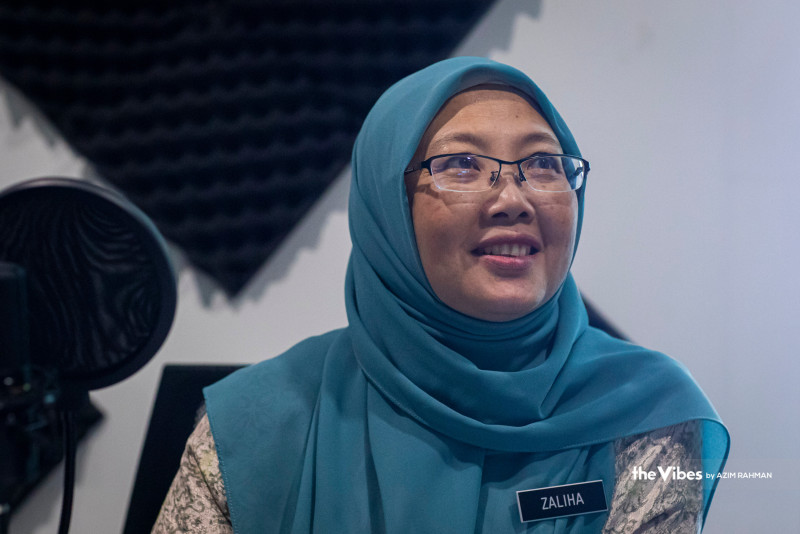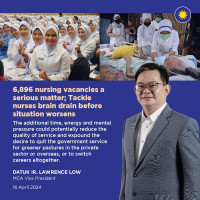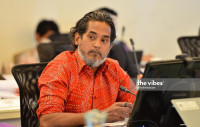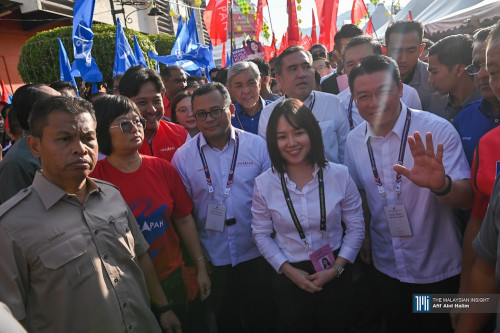HAVING access to quality healthcare is a basic need for everyone and here, in Malaysia, the Health White Paper aims to do just that. Firmly aligned with the principles of Ekonomi Madani, it will help ensure a health system that caters to the needs of everyone and also the long-term sustainability of our healthcare resources.
Health Minister Dr Zaliha Mustafa, the first woman in the country to hold the portfolio, recently spoke to The Vibes and Sinar Daily in detail on the Health White Paper and what it means for the future healthcare of our nation.
Q: Good morning, YB Minister. Thank you for joining us today to discuss the concept of Ekonomi Madani, and how it relates to the Health Ministry’s vision for the health sector. Can you please begin by explaining the main objectives of the Health White Paper and how it contributes to the principles of Ekonomi Madani?
Dr Zaliha: Good morning, and thank you for having me. The Health White Paper is a milestone in our nation’s healthcare development as it sets the case for health system reform. Its main objectives are to achieve equitable access to high-quality healthcare services for all citizens, strengthen and enhance the overall health and well-being of our rakyat and ensure the sustainability of Malaysia’s healthcare system.
The Health White Paper provides a framework for reform over the next 15 years. It gives a roadmap focused on enhancing the efficiency of healthcare delivery, improving primary healthcare, promoting health and disease prevention – we want to move from sick care to healthcare. Importantly, it also addresses healthcare financing and governance, both of which are key foundations for our healthcare service.
The Health White Paper is firmly aligned with the principles of Ekonomi Madani. Ekonomi Madani emphasises inclusivity, sustainability, and social well-being alongside economic growth. Through the white paper, we are promoting an inclusive health system that caters to the needs of every individual, regardless of their socio-economic status, while also ensuring the long-term sustainability of our healthcare resources.
Ultimately, we believe that a healthy population is a productive population, and by investing in health, we will enhance the overall well-being of our citizens.
Q: That’s commendable, YB. Could you elaborate on the specific strategies outlined in the Health White Paper that directly address the principles of Ekonomi Madani?
Dr Zaliha: Absolutely. The Health White Paper encompasses several key strategies that align with the principles of Ekonomi Madani.
Firstly, it focuses on strengthening our primary healthcare sector. This is crucial for promoting preventive measures and early interventions. By emphasising primary healthcare, we aim to address health issues at their root cause and reduce the burden on specialised and costly hospital services. This approach not only enhances the overall well-being of our citizens but also contributes to the economic productivity of the nation, as healthier individuals can participate more actively in the workforce.
Secondly, the Health White Paper emphasises health education and promotion. Through public awareness campaigns and education programs, we strive to empower individuals to take charge of their health and make informed decisions. This proactive approach aligns with Ekonomi Madani’s focus on fostering a knowledgeable and health-conscious society that can actively contribute to the country’s progress.
Thirdly, with the “whole of government and whole of society approach”, everyone plays a role in making healthcare a national agenda. We aim to break down walls and work more across siloes. With such a concerted effort, we will be able to make use of the budget more efficiently and effectively.
Lastly, the white paper emphasises the importance of collaboration and innovation within the healthcare sector. By encouraging public-private partnerships, we can leverage the strengths of both sectors to enhance healthcare accessibility and efficiency.
A prime example of private-public partnerships is Skim Perubatan Madani (SPM), which was launched by the government on June 15, 2023. SPM is aimed at addressing congestion in public healthcare facilities by providing the B40 with access to acute primary care services for free, at participating private GP clinics. It is estimated that 700,000 households will benefit from this scheme, leading to improvements in patient well-being as well as providing private GPs with an opportunity to generate additional income. SPM is currently being piloted in 10 districts, and will soon be expanded across more districts to meet demand.
These collaborative and innovative efforts align with the principles of Ekonomi Madani, which values collective progress and sustainable development.
Q: Thank you for the insightful explanation, YB. Moving on – how does the Health White Paper address any potential challenges in implementing its strategies within the context of Ekonomi Madani?
Dr Zaliha: There is no doubt that implementation is the biggest challenge. One significant challenge is to ensure sustainable and equitable health financing.
We are grateful to Prime Minister Datuk Seri Anwar Ibrahim for embracing the suggestion of gradually increasing publicly managed health funding to 5% of GDP, as suggested within the Health White Paper. Of course, this will require better governance and we must ensure that resources are used efficiently and effectively. Further substantial investments will be required over time to develop healthcare infrastructure, workforce development and technology.
Another challenge is addressing regional disparities in healthcare services and accessibility. Ekonomi Madani emphasises inclusivity and equal opportunities for all, and we must ensure that people in rural and underserved areas have fair access to healthcare services. The white paper outlines long-term plans to improve infrastructure and increase healthcare personnel as a framework to ongoing efforts.
For instance, the Health Ministry has embarked on a project to upgrade public healthcare facilities nationwide. This ongoing initiative involves repair and upgrading works at 1200 facilities identified to have structural, mechanical and electrical or safety issues, with an allocation of RM111 million in 2023.
To fortify human resources for health, the Health Ministry has recently appointed 4914 doctors, dentists and pharmacists to permanent positions, and is in the process of finalising the appointment of 6,441 healthcare professionals across various schemes. The government has also committed to appointing 12,800 doctors on a permanent basis by 2025. Furthermore, a high-level committee has been established to definitively address the issue of contract doctors, by comprehensively reviewing the entire ecosystem, including education and practical training, licensing and registration, public sector recruitment, deployment and retention. The Health White Paper emphasises the need to invest in the training and development of healthcare professionals, ensuring that we have a skilled workforce capable of providing high-quality care.
Q: YB, in addition to the alignment with Ekonomi Madani, could you discuss how Malaysia’s Health White Paper addresses the challenges posed by digitalization, population ageing, and the rising prevalence of non-communicable diseases (NCDs)?
Dr Zaliha: Digitalization, an ageing population, the increasing burden of NCDs are global issues affecting many nations. We recognise the potential impact of these issues – and others such as climate change – and have taken these factors into consideration for the White Paper.
One of the key goals of my administration is to transform our ability to serve the rakyat by using digital technology. Through telemedicine and remote monitoring, we aim to reach remote and underserved populations, providing them with essential healthcare services without the need to travel long distances. Moreover, the Health White Paper emphasises the adoption of electronic medical records (EMR) and Electronic Lifetime Health Records (ELHR) to enable seamless information sharing between healthcare providers, thereby improving care coordination and reducing medical errors. By investing in health information technology, we can optimise healthcare resources, making the system more resilient and responsive to the challenges of digitalization.
Regarding population ageing, we must remember that ageing affects all of us, and will affect all agencies and ministries as well. This is one key reason the white paper proposes strengthening inter-agency and inter-sectoral coordination in developing policies and programs that enable healthy ageing and the provision of long-term care for the elderly. This approach aligns with the principles of Ekonomi Madani, as it seeks to promote the well-being and dignity of all Malaysians, regardless of age.
The rising prevalence of NCDs is another significant health challenge facing Malaysia. Diseases like diabetes, hypertension, cardiovascular diseases, and certain cancers are on the rise, contributing to a substantial burden on the healthcare system and the economy. The Health White Paper takes a proactive approach to address this issue, focusing on preventive measures, health promotion, and early detection.
By investing in health education and awareness programs, we aim to empower individuals to adopt healthier lifestyles and make informed choices about their health. Moreover, the white paper emphasises the importance of community-based interventions to address risk factors and provide support for those living with NCDs. By shifting the healthcare system’s focus towards prevention and primary care, we can better manage NCDs and reduce the strain on specialised healthcare services.
Q: Thank you, YB. Finally, do you have any parting message that you would like to share with the readers?
Dr Zaliha: As a family doctor, I have always believed that healthcare is not a cost, but an investment. This is very much in keeping with the core values of Ekonomi Madani and the Health White Paper, where we recognise that economic growth for the sake of growth is insufficient. A healthy community forms the backbone of a happy and productive society.
Although the Health White Paper provides a 15-year runway for reform, I am committed to pushing for the necessary changes within this parliamentary sitting. As a next step, I will finalise the terms of reference and composition of a Healthcare Reform Commission which will be given independent authority to oversee the reform. – The Vibes, August 18, 2023








_and_Mariammah_Krishnan_(right._back-row__far_left).png)













_with_chow_seated_beside_with_the_state_dap_leaders-Facebook_pic.jpg)




_president_Muhammad_Azlan_Abas-Najjua_Vibes_pic.PNG)
